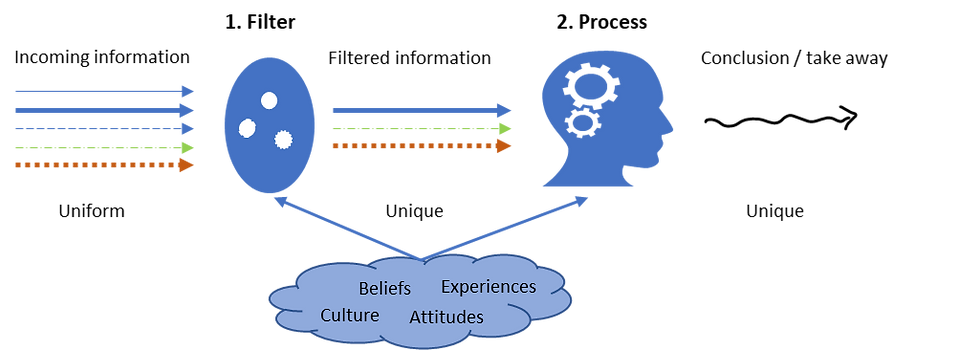What Do You Mean We Perceive Things Differently?
- Georgi Danov
- May 22, 2021
- 6 min read
"In this treacherous world nothing is the truth nor a lie. Everything depends on the colour of the crystal through which one sees it" - Pedro Calderón de la Barca.

I often think about the pressures of modern life. We are supposed to live in the most liberal of times, and yet somehow paradoxically, it feels like we don’t. We, as humans, and like all other species, live according to certain norms dictated by our social environment. This is, of course, understandable, and necessary, but am I the only one feeling like the boundaries of these norms become narrower? It could be globalisation, or large-scale shifts in paradigm, but we are slowly converging towards a similar behavioural model, reinforced by the society. Here is the paradoxical thing – on one side we are promoting inclusion, diversity, the richness of all nearly eight billion individuals living on this planet, and yet, on the other side, mainly through the power of social media, we reinforce an expect a single, “to be emulated” behavioural model. We are free to feel, think and do anything we want (within some ethical and legal norms, of course), so long as it fits the views of the society within which we live. Perhaps it is just me, but I feel like too often we expect others to think and act like us, while failing to consider the cultural and individual aspects, which make each one of us unique. This often reminds me to the famous Henry Ford saying regarding its Model T, “Any customer can have a car painted any colour that he wants, so long as it is black”.
In light of this philosophical introduction, the topic I am going to cover in this article is dedicated to the way we all perceive things and why we perceive them differently. Because there is a deceptively simple relationship between who we are, how we perceive information and how our perceptions manifest themselves in actions. As each one of us is a unique mixture of experiences, cultural and societal influences, and strictly individual traits, this can only mean that we perceive and interpret information differently to a unique set of outcomes. Yet, we very often seem to forget that in our expectations towards others.
Perceptions are an interesting thing. We all see, read, hear, smell the same thing, but we can interpret all this incoming information in a virtually unlimited number of ways. This is not something we spend a lot of time considering, though. It is easier to assume that everyone perceives information the way we do, completely omitting the individuality each one of us carries. I guess, this is the result of the self-centeredness that many of us tend to exhibit. If we see object A and think of it in a certain way, then so must everyone else. But this is not how things work in real life. Perceptions are just as much an internal reflection of our experiences, beliefs, and attitudes, as they are of the information we receive from the outside. As the American author Gary Zukav eloquently puts it, “What is behind your eyes holds more power than what is in front of them.” It is this internal element we often tend to forget, which becomes the reason for so many misunderstandings and unmet expectations. As a foreigner living in the UK, I know this all too well. My different cultural background has more than once caused breaks in communication with others and provoked a spoken or unspoken, “how could he say that?”
How Perceptions Work
So here is the thing. We consume information from the external world via our five senses. We all receive the same stream of information, but some of it gets filtered out, while the rest is retained and processed. Generally, we receive too much information for our brains to cope with, so naturally they need to filter some out to avoid a massive information overload. But which part to exclude, and which to retain is very individual. It depends on what we consider relevant for us based on our values, experiences, and beliefs. The retained information then gets processed based on a complex interplay of each our past experiences, values, and attitudes. It works like a massive decoding engine, which tries to make sense of the incoming information, but it is unique to each one of us. They way we decode this information is as much as reflection of ourselves, as it is of the words coming in. If I could express this pictorially, it would be something like this.

Here is a simple example. Let’s say we have five people – Persons A, B, C, D and E. With Person A talking to each of the rest separately, but saying the same thing, something like, “Jack and I went out a couple of times last week. We went for a meal at this Italian restaurant on Tuesday evening and once again for a few drinks on Friday with some of his work colleagues. It felt quite nice to have a meal and some drinks out, for a change. It has been a long and boring lockdown after all but ended up spending quite a bit.”
Person B (a good friend of A and shares similar values) takes the message on a face value, as a very harmless statement between friends and feel happy for them.
Person C (who has been struggling financially lately and spending has been a lot on their mind) only hears, “dine out – expensive, drinks out – expensive” and is left with a sour taste in their mouth and an impression of their Person A bragging about going out, thinking, “how could you be so insensitive, good for you, but not everyone got the money to splash out twice a week… or once even…”
Person D (35 years old and still single, while the rest of their fiends are all married by now), cannot help it but read into this from a relationship status, thinking “yeah, yeah Jack this, Jack that, stop throwing your love in my face…”
Person E (someone who’s had a family member almost die from COVID) – “unbelievable, how can you be so socially irresponsible, you went out twice in a week? Do you not have any regard to other people’s lives, for the love of God!?!?!”
It is the exact same message by Person A, but the meaning it conveys to different people is dramatically different. Of course, Person A, who didn’t think any of that, was completely oblivious to the emotions and thoughts this message could evoke, because if their mind they only saw it on a face value, devoid of emotional charge. They would expect this message would be perceived by its recipients the way they intended it. On the other side, Persons B, C, D and E, who have their own problems and emotional baggage, cannot help it, but read too much into it.
What We Think We know But Often Forget
The reality is, we all have emotional baggage, some more, others less, but we all do. Our cultural and socio-economic backgrounds, our experiences, our relationships with others, our attitudes towards certain things, they all have an impact on the way we perceive the world. But way too often, we forget that. It is not surprising, however, that we are a lot more perceptive of these “soft” factors, when we are on the receiving end. This is natural, we are in our heads all the time, we know our own problems, struggles and thoughts, but our self-centeredness, creates the false impression that others should be aware of these elements too. More often than not, they aren’t. We often put the blame on others when a certain comment or action evoke an emotional response in us, thinking they are being insensitive, socially unaware, or outright rude. The fact is, communication and perceptions are two- way road, we play just as big a role in interpreting certain information, as other do in sending it. It is just easier to blame the others. Since our behaviour and actions are to a large extend a reflection of our perceptions and inner selves, we can witness a markedly different response to the same information. Often this leaves us bewildered, shocked or angered. That’s because we implicitly expect everyone else will think, feel and act like us, once again completely ignoring the soft and emotional side each one of us carries. On some level we understand that we are all different human beings and act, feel, behave differently, yet in many every-day situations, we completely forget it. All this goes to show is that what think we know and what we actually know are often very different things.




Congrats for the article!Well done !